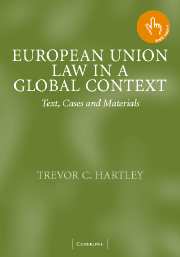Book contents
- Frontmatter
- Contents
- Preface
- Acknowledgements
- How to use this book
- Table of cases
- Numerical table of ECJ cases
- Table of treaties and other instruments
- Table of panels
- List of abbreviations
- Latest development: the proposed Constitution for Europe
- Chapter 1 Introduction
- PART I The European Union
- Chapter 2 Origins
- Chapter 3 Legislative institutions
- Chapter 4 Legislative powers
- PART II International adjudication
- PART III Relations Between Legal Systems: International Law, Community Law and National Law
- PART IV The Community and the world system
- PART V Fundamental Rights
- PART VI Direct Actions in the European Court
- PART VII Substantive Law – Taste
- Index
- References
Chapter 4 - Legislative powers
Published online by Cambridge University Press: 05 June 2012
- Frontmatter
- Contents
- Preface
- Acknowledgements
- How to use this book
- Table of cases
- Numerical table of ECJ cases
- Table of treaties and other instruments
- Table of panels
- List of abbreviations
- Latest development: the proposed Constitution for Europe
- Chapter 1 Introduction
- PART I The European Union
- Chapter 2 Origins
- Chapter 3 Legislative institutions
- Chapter 4 Legislative powers
- PART II International adjudication
- PART III Relations Between Legal Systems: International Law, Community Law and National Law
- PART IV The Community and the world system
- PART V Fundamental Rights
- PART VI Direct Actions in the European Court
- PART VII Substantive Law – Taste
- Index
- References
Summary
The European Union is unique among international organizations in the breadth and depth of its legislative powers. These powers form the subject matter of this chapter.
Our starting point must be the principle that the Community and its institutions possess only such powers as are conferred upon them by the Treaties. This principle of conferral, which is sometimes also called the principle of limited powers (competences), is laid down in Article 5 [E] TEU and Article 5 [3b] EC. The former reads:
The European Parliament, the Council, the Commission, the Court of Justice and the Court of Auditors shall exercise their powers under the conditions and for the purposes provided for, on the one hand, by the provisions of the Treaties establishing the European Communities and of the subsequent Treaties and Acts modifying and supplementing them and, on the other hand, by the other provisions of this Treaty.
Article 5 [3b] EC reads:
The Community shall act within the limits of the powers conferred upon it by this Treaty and of the objectives assigned to it therein.
In order to discover the legislative powers of the Community we must, therefore, look at the provisions of the Treaties.
Subject to one partial exception (discussed below), the Treaties do not confer any general legislative powers. Instead, there are provisions granting the power to legislate with regard to specific matters, such as agriculture or free movement of workers. This gives rise to one of the perennial problems of Community legislation, the question of “legal basis”.
Information
- Type
- Chapter
- Information
- European Union Law in a Global ContextText, Cases and Materials, pp. 44 - 68Publisher: Cambridge University PressPrint publication year: 2004
